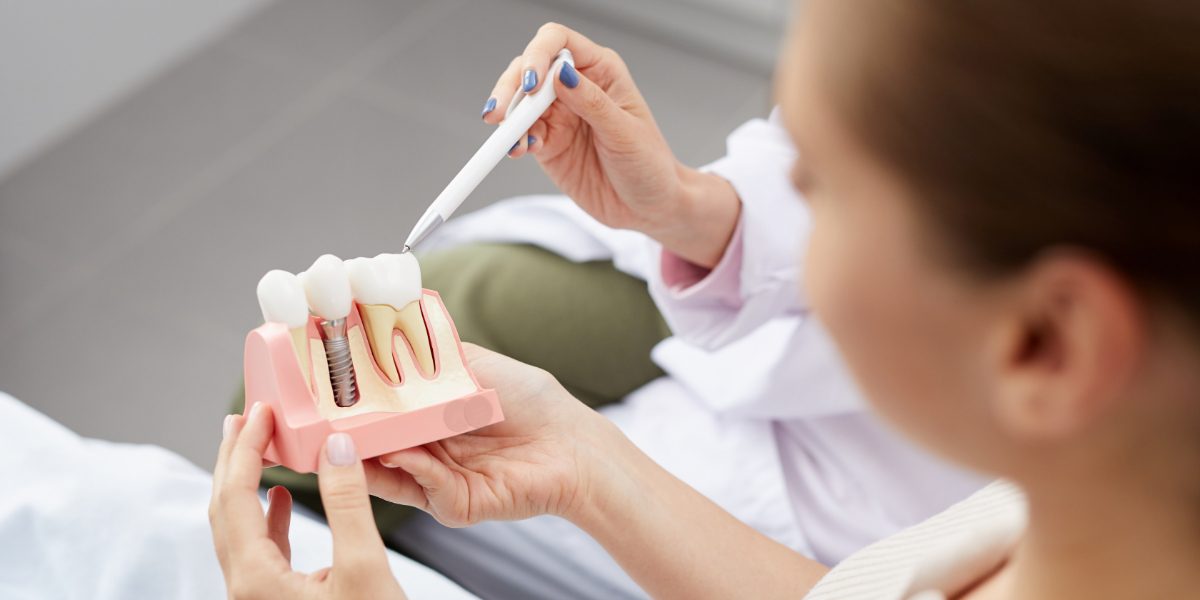
Every year, many Havre de Grace residents come to The Maryland Center for Oral Surgery and Dental Implants with the same question: “How many teeth can dental implants replace?” The answer often pleasantly surprises them. You see, dental implants can be used to replace an entire mouth full of teeth, providing you with a full mouth restoration. But, how is a full mouth restoration different from receiving a single dental implant? And how does a full mouth restoration with dental implants differ from dentures? Keep reading to learn more.
What Are Dental Implants?
Dental implants are now considered the best tooth replacement option available. Comprised of two parts, a titanium implant that acts as a tooth root, and a realistic looking tooth crown, getting dental implants is a process, but one that many Havre de Grace residents find to be extremely rewarding. The process of getting dental implants is as follows:
- If the tooth that needs to be replaced is still in the mouth, a tooth extraction is performed. In some cases, the dental implant can be placed immediately after a tooth is surgically removed. In other cases, it is better to wait several weeks before implant placement.
- Once you are cleared for dental implant surgery, the dental implant is inserted into the jawbone, using a gentle surgical technique.
- A temporary tooth, or a removable flipper, similar to an orthodontic retainer with a tooth, is placed over the dental implant for aesthetic purposes.
- Several weeks later, when the bone has remodeled around the dental implant, a connector post, called an abutment is attached to the implant. The restorative dentist will then create the final crown with the dental lab technician and attach it to the abutment.
How Does Getting a Single Dental Implant Differ from Getting a Full Mouth Restoration with Dental Implants?
If you’re a Havre de Grace resident who needs a full mouth restoration, you may be feeling overwhelmed at the thought of having oral surgery to place 28 dental implants in your mouth. Rest assured, this is not necessary! There are several options for complete tooth replacement, ranging from a special denture supported by only two dental implants, to 5 or 6 implants supporting a specially designed prosthesis that is not removable, to porcelain bridges supported by a metal frame connected to multiple implants. Your surgeon will discuss the various options and recommend the ideal treatment plan for your individual needs.
How Do Dental Implants Differ from Dentures?
Havre de Grace residents should know that dental implants differ greatly from dentures. First, dental implants replace the missing tooth roots and provide a stable foundation for replacement teeth. There are options for both removable and non-removable replacement teeth, but they are all secured to the dental implants. Dentures, on the other hand, rest on the gums and can only be “secured” with an adhesive. They are removable and must come out every night.
Second, since implant-supported replacement teeth are secured to the dental implants you don’t have to worry about them slipping and sliding when you eat, speak and smile. Dentures, however, are known to shift during these activities. Third, when you are missing teeth, you are at risk for jawbone shrinkage, or bone resorption. Since dental implants are substitute tooth roots, placed in the bone, they stimulate the growth of the jawbone and prevent bone resorption. Dentures actually accelerate bone resorption, or deterioration, eventually leading to collapse of facial structure.
Finally, dental implants are designed to last a lifetime, while dentures need to be replaced as often as every five years.
Schedule a Consultation to See How Dental Implants Can Transform Your Smile Today
If you are missing most or all of your teeth and you are ready to explore the option of dental implants, then there’s no time like today to take the next step!
Contact The Maryland Center for Oral Surgery and Dental Implants to schedule a consultation and oral examination at 410-838-7301.





